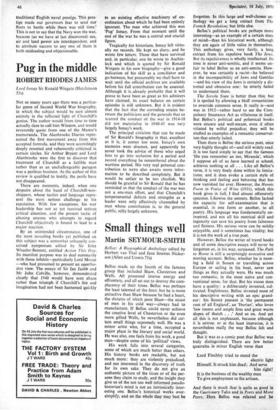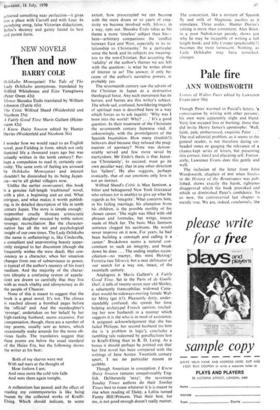Small things well
Martin SEYMOUR-SMITH
Belloc: A Biographical Anthology edited by Herbert van Thal and Jane Soames Nicker- son (Allen and Unwin 75s)
Belloc. made up the fourth of the famous group that included Shaw, Chesterton and Wells. All possessed intense energy and effrontery, and all set out to destroy the com- placency of their times. Belloc was perhaps the least talented of the four; but he is more attractive than Shaw because he had a heart, the dictates of which poor Shaw—the nicest of men in his cold way—always had to manufacture. If Belloc could never achieve the creative level of Chesterton or the even more gifted Wells, he nevertheless did cer- tain small things supremely well. He was a minor artist who, for a time, occupied a major place in the literary and social world. He was also, one feels from his work, a good man—despite some of his 'political' views.
His work falls into several categories, some of which are much better than others. His history books are readable, but not much more: they are violently prejudiced, and not interested in the discovery of truth for its own sake. They do not give an authentic picture of the tires or of the per- sons they claim to study, and the insight they give us of the not too well informed pseudo- historian's mind is not an intrinsically inter- esting one. Belloc's historical works over- simplify, and on the whole they may best be forgotten. In this large and well-chosen an- thology we get a long extract from The French Revolution; but little else.
Belloc's political books are perhaps more interesting—as an example of a certain state of mind—than his historical work, although they are again of little value in themselves. This anthology gives, very fairly, a long extract from his repulsive book The Jews. But its repulsiveness is wholly intellectual. Its tone is never anti-semitic, and it seems un- fair to label Belloc as an anti-semite. How- ever, he was certainly a racist—he believed in the incompatibility of Jews and Gentiles —and his view of the Jews is certainly a dis- torted and obsessive one: he utterly failed to understand them.
The Servile State is better than this; but it is spoiled by allowing a bluff romanticism to override common sense. It really is—and was in 1912—rather hard to see the Com- pulsory Insurance Act as villainous in itself. But Belloc's political and polemical books were sincere and well-meant, even if often vitiated by wilful prejudice; they will be studied as examples of a romantic conservat- ism that utterly failed.
Then there is Belloc the serious poet, once very highly thought of—and still widely read. It is too hard simply to say that the famous `Do you remember an inn, Miranda', which I suppose all of us have learned at school, achieves nothing at all . . . Like all Belloc's verse, it is very finely done within its limita- tions; and it does evoke a certain style of thinking and feeling and behaving that has now vanished for ever. However, the Heroic Poem in Praise of Wine (1931), which this book gives in full, I find almost offensively specious. Likewise the sonnets. Belloc lacked the capacity for self-examination that is essential, in one form or another, to all poetry. His language was fundamentally un- inspired, and not all his metrical skill and ingenuity can save his poetry from falseness and flatness. His serious verse can be mildly- enjoyable, and it sometimes has vitality; but it is not the work of a true poet.
However, Belloc the writer of travel books and of some descriptive essays will never be forgotten or, in his way, surpassed. The Path to Rome is still a surprisingly evocative and moving account. Belloc, whether he is mow- ing a field in Sussex or travelling across Europe or sailing in his boat, never saw things as they actually were. He was much too romantic, in the most naive and con- ventional sense, for that. But his vision does have a quality: a deliberately invented, cul- tivated, Englishness. Belloc invested most of his descriptive writing with an epic grand- eur: his Sussex peasant is 'the permanent root of all England', an 'Iberian', who loves low rooms and ample fires and great warm slopes of thatch . . .' And so on. And yet all this is not unpleasant, because although it is untrue, or at the least imprecise, it is nevertheless really the way Belloc felt and thought.
But it was as a comic poet that Belloc was truly distinguished. There are few better quatrains in minor English verse than Lord Finchley tried to mend the electric light Himself. It struck him dead: And serve him right!
It is the business of the wealthy man To give employment to the artisan.
And there is much that is quite as good in the Cautionary Tales and in Peers and More Peers. Here Belloc was relaxed and he
achieved something near perfection—it gives him a place with Carroll and with Lear. In parodying smug, false Victorian didacticism, Belloc's decency and gaiety found its best and purest form.























































 Previous page
Previous page